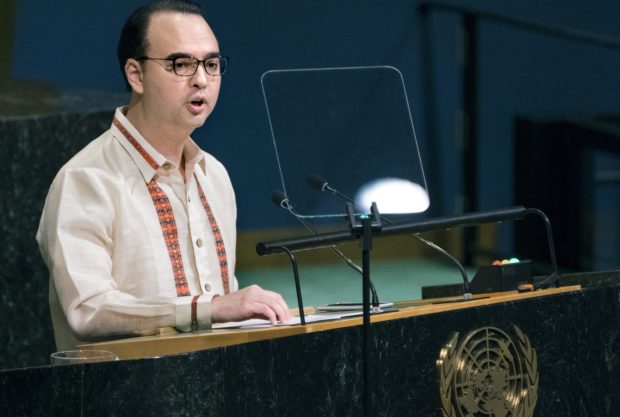
Philippine Foreign Affairs Secretary Alan Cayetano at the UN, defending President Duterte’s war on drugs. AP PHOTO
In defending Rodrigo Duterte at the United Nations last week, Secretary of Foreign Affairs Alan Cayetano used a strikingly curious word: “salvaging.”
“As a sovereign and democratic country led by our duly-elected President, we are on track in salvaging our deteriorating country,” Cayetano said.
Cayetano was arguing that Duterte, now known worldwide as the leader who inspired mass killings in the Philippines, was in fact saving or reclaiming the country by waging the bloody campaign.
But “salvaging” has other meanings.
Fans of the TV series “The Handmaid’s Tale” would be familiar with the term, which refers to the public and very brutal execution of women and men condemned as criminals by the dystopian regime.
But “salvaging” also has an older meaning rooted in a dark chapter in Philippine history. During the regime of Ferdinand Marcos, “salvaging” was slang for “summary execution.”
“Sinalvage” was a common expression in the 1980s to refer to an individual — an activist, a political leader, or even an ordinary citizen — who was abducted, tortured, murdered before being dumped in some ditch.
“Naku baka ma-salvage ka. Be careful, you might get salvaged,” was a typical warning to an activist, or to anyone complaining about the way things were under Marcos.
“Salvaging” in the Marcos era was based on a cynical, cruel definition. At a time when anyone accused or suspected of opposing Marcos was branded a communist, “salvaging” meant saving Filipinos from the communists — by killing them.
My friend, the poet and journalist Pete Lacaba explained the evolution of “salvaging” as a term that means “extrajudicial execution.”
“It began as an Anglicization or Englishing of the Tagalog word ‘salbahe,’ whose meaning ranges from mischievous or abusive (adj.) and a notoriously abusive person (noun). ‘Salbahe,’ in turn, is derived from the Spanish word ‘salvaje,’ wild, undomesticated, savage,” Pete wrote.
Pete’s explanation was cited by a visiting Harvard law student who volunteered with the Task Force Detainees of the Philippines in 2006. Nate Ela, now a Chicago-based attorney, was puzzled by the term.
“I encountered the first cases of salvaging even before lunch on my first day as a volunteer at Task Force Detainees of the Philippines,” he wrote in an essay. “And I must admit, I didn’t quite know what to make of it. At base, of course, the photos that I saw in the Museum of Courage and Resistance, which portrayed corpses of activists scattered along a road, were simple enough to understand. They hit me in the gut: anger, disgust, sadness.
“But it was the captions, the labels that confused me. “’Salvagings?’ I asked. Like most non-Filipinos, I’d never heard of a human rights violation called salvaging.”
A Filipino activist explained to him: “That’s how many people here talk about summary execution and extrajudicial killings, especially those during martial law.”
“Huh, I thought,” Ela continued. “An established local term in the midst of a discourse that is constantly declaring its universality. Odd.”
But Ela also observed: “Compared to the sterility and ungainliness of ‘extrajudicial killing’ and ‘summary execution,’ ‘salvaging’ remains a powerful term.”
In his speech at the UN, Cayetano said, “We may sometimes differ in how we express ourselves, yet this should not be interpreted as turning our backs on the universal declaration on human rights.”
What’s truly ironic is that, a couple of days before Cayetano’s speech, Duterte expressed himself in a way that completely debunked the picture the foreign affairs secretary presented to the UN. In a startling admission, Duterte declared: “My only sin is the extrajudicial killings.”
To his credit, Duterte admitted to his crime without using slang, code words or euphemisms. For a brief moment last week, the leader who ushered in an era of lies and slaughter, appeared to be trying to salvage, save, reclaim — not suppress, bury, or kill — the truth about what he has done to the country.
Visit the Kuwento page on Facebook.

